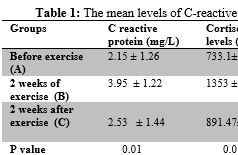Assessment of Some Biochemical and Immunological Changes during Strenuous Exercise in Undergraduate Students
DOI:
https://doi.org/10.54117/iimj.v3i1.7Keywords:
Exercise, c-reactive protein, cortisol, TIBC, creatinine kinaseAbstract
Background: Strenuous exercise may cause alterations in iron metabolism, that initiate some acute phase response that would be expected to induce significant damage to skeletal muscle as well as significant changes in other biochemical and immunological parameters.
Aim: The aim of the study is to determine the effect of strenuous exercises on some biochemical and immunological parameters in exercising undergraduate students.
Methodology: Forty-eight undergraduate students were recruited from the Department of Physiology, Chukwuemeka Odumegwu Ojukwu University, Uli. Five ml (5 ml) fasting blood sample was collected into plain sample containers from each of the participating individuals by venipuncture prior to the exercise. On each of the three occasions, samples were withdrawn between 7.30 am and 9.00 am. The subjects were then placed on their respective physical exercise and closely monitored by attendance during their training sessions. Blood samples were collected after two and four weeks post-exercise. All samples were analysed using standard spectrophotometric methods. Data were statistically analyzed using Statistical Package for the Social Sciences (SPSS) for Windows version 20.0 software. All data were expressed as Mean ± Standard Deviation (SD).
Results: The results showed that there is a significant increase in C reactive protein when the baseline pre-exercise was compared with two weeks of exercise (p< 0.05), however, when the baseline study was compared with two weeks post-exercise it was not significant. Cortisol and serum iron concentration was found to be increased within two weeks of exercise and two weeks after exercise when compared with the baseline study. Total iron binding capacity was found to be significantly increased within the 2 weeks of exercise and after two weeks of exercise when compared with the baseline study. The mean level of creatinine kinase was significantly raised within 2 weeks of exercise when compared with the baseline study. However, it was found to be significantly decreased after 2 weeks post-exercise. The mean levels of albumin and total protein did not differ significantly when the baseline study was compared with two weeks of exercise and post-exercise. The mean levels of IgG and IgM were significantly increased within two weeks of exercise and two weeks post-exercise when compared with the baseline study.

Downloads
Published
How to Cite
Issue
Section
License
Copyright (c) 2023 Michael Chinedu Olisah, Walter Chukwuma Nwafia, Peter Chibuike Onwugbufor, Olisa Raymond Nwachukwu, Catherine Nicholate Dim

This work is licensed under a Creative Commons Attribution 4.0 International License.
